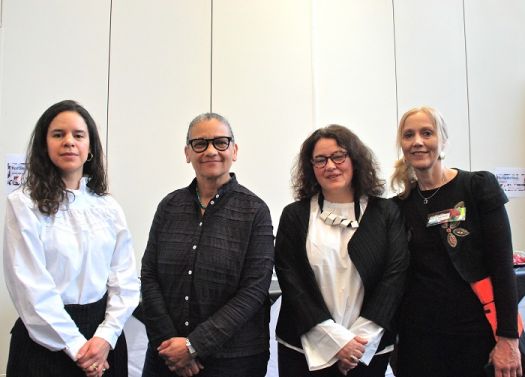Turner Prize winner opens Textile and Place conference
10 April 2018
Lubaina Himid spoke at the event hosted by Manchester School of Art and The Whitworth
Turner Prize winner Lubaina Himid opened a two-day conference illuminating the relationship between textiles and place in an age of globalisation, population displacements and political instability.
Hosted by Manchester School of Art and The Whitworth, the ‘Textile and Place’ conference demonstrated how textiles have always been used to tell stories about who we are and how and where we live.
The significance of textiles and their links in production, sustainability to place, in how it is worn, collected, and as marker of cultural identity, has been amplified by contemporary global issues.
Turner Prize winner
Keynote speaker and reigning Turner Prize winner Lubaina Himid is an artist and Professor of Contemporary Art at the University of Central Lancashire. Her art focuses on themes of cultural history and reclaiming identities. She was one of the first artists involved in the Black Art movement in the 1980s and continues to create activist art which is shown in galleries in Britain, as well as worldwide.
Himid spoke to around 100 delegates about her work influenced by Kanga garments and their patterns and slogans, which she began to explore as a method of communication following a commission by The Whitworth in 2011.
She was introduced by Penny Macbeth, Dean of Manchester School of Art, who said: “This is a very timely moment to celebrate Manchester’s textiles heritage in this way…This is our 180th anniversary year, we are the oldest undergraduate art school in the country and were set up to train the designers for the textile industry in Manchester during the Industrial Revolution.
“The School of Art has always had a rich tradition of crafting and innovation and has always kept close to our heritage whilst looking to the future. Part of what we do here is the construction of new ideas that stretch and test us.”
An international panel of artists and academics went onto discuss issues ranging from the 300-200BC Paracas Textile, one of the earliest examples of socially engaged cloth, to the traditional embroidery and bobbin lace craft of Afro-Brazilian warrior women, the domestic identity of ‘queer quilts’ and textile art which traces stories of migration.
Forgotten crafts such as the Aboriginal Australian textiles from the Northern Territory and works from the Fiber Art Movement in Atlanta were discussed, as well as innovations and sustainability challenges in the textiles industries.
The School of Art has always had a rich tradition of crafting and innovation and has always kept close to our heritage whilst looking to the future. Part of what we do here is the construction of new ideas that stretch and test us.
Textile artist Raisa Kabir performed as part of the event at the Whitworth on the Thursday evening. She utilises woven textiles, sound, video and performance to translate and visualise concepts concerning the politics of cloth, labour and cultural anxieties surrounding nationhood and borders.
Kabir’s work can be seen in the exhibition, Beyond Borders, currently on at the Whitworth. The exhibition brings together four artists working on issues around post-colonial identity, fragmentation, authenticity, displacement and belonging. These artists are based in Pakistan, India, Bangladesh and England, having developed artworks around these issues in response to the Whitworth’s and Manchester collections, experimenting with a range of media such as textiles, fibres, embroidery, film, photography and performance. The exhibition will highlight the changing landscape of the subcontinent in the 21st century, post independence and partition.
Alice Kettle, Professor of Textiles at Manchester School of Art at Manchester Metropolitan University and organiser of the conference, said: “Textile as a socially dynamic, communicative and active material offers a rich seam of enquiry into how textile participates and influences our lives.
“The historical links between Manchester School of Art and the Whitworth were formed at the establishment of the Design School under the direction of Walter Crane in the 19th century for training designers in Manchester’s textile industry. The collections at the Whitworth represent this connection with textiles powerfully linked to the global political, economic, artistic and trading narratives of Manchester.
Other speakers included:
- Alistair Hudson, Director of the Whitworth and Manchester Art Galleries. Prior to his move to Manchester, Alistair was Director of Middlesbrough Institute of Modern Art where his vision was based on the concept of the Useful Museum. In the preceding 10 years he was Deputy Director of Grizedale Arts which gained critical acclaim for its radical approaches to working with artists and communities, based on the idea that art should be useful and not just an object of contemplation.
- Dominique Heyse-Moore, Senior Curator of Textiles and Wallpapers at the Whitworth
- Catherine Harper, artist, writer and editor of TEXTILE: Cloth & Culture
- Lesley Millar, Professor of Textile Culture and Director of the International Textile Research Centre at the University of the Creative Arts, and curator of some of the most significant British textile shows including Textural Space (2001) Cloth and Memory (2013‘H_er_e &_ _N_o_w : c_o_n_t_e_m_p_o_r_a_r_y_ _t_a_p_e_s_t_r_y_’ _(_2_0_1_6_-_1_7_)_
- Kate Fletcher, Research Professor at the University of the Arts whose work has been pioneering in the fields of slow fashion and sustainability



